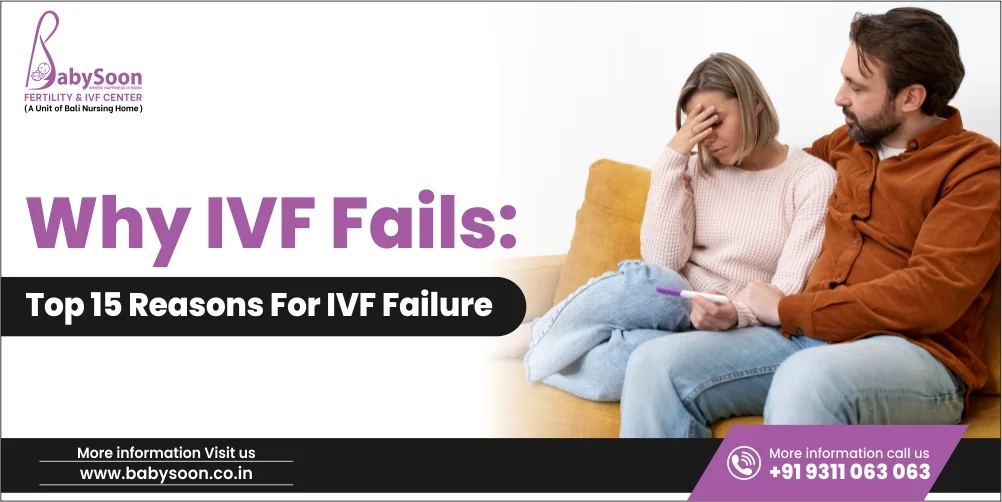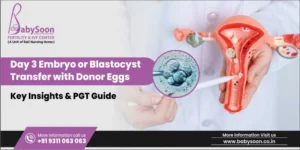IVF has been the ray of hope for couples struggling with infertility. It offers the possibility of parenthood when natural conception is difficult. However, even with remarkable medical developments, IVF lacks guaranteed success, especially in the first few attempts. There are multiple reasons responsible for IVF failure, but with proper identification of the reason, an advanced medical approach and lifestyle adjustments, these discrepancies can be overcome. With an understanding of these challenges and by implementing effective strategies, BabySoon has been significantly improving couples’ chances of achieving a successful pregnancy through IVF.
How does IVF work?
IVF is a reproductive technology designed to help infertile couples conceive naturally. Dr. Jyoti Bali, a renowned gynaecologist and infertility specialist, typically follows this process at BabySoon for successful IVF results:
Step 1: Ovarian stimulation
Fertility medications are injected to produce multiple mature eggs.
Step 2: Ovum pick-up
Using ultrasound, a thin needle is inserted to collect eggs from the ovaries after maturity.
Step 3: Sperm collection
High motile sperm are collected from the male partner for fertilization.
Step 4: Fertilisation in the lab
Using intracytoplasmic sperm injection, eggs and sperm are combined to form embryos within 3 to 5 days.
Step 5: Embryo transfer and implantation
The best quality embryos are chosen for transferring into the woman’s uterus, and after the successful implantation of the embryos to the uterine lining, pregnancy is confirmed by a blood test called Bhcg.
15 reasons responsible for IVF failure
Although IVF has been effective for infertile couples to achieve the feeling of parenthood, Dr. Jyoti Bali, founder of BabySoon, has enlisted some significant reasons for its failure, as listed below. She ensures to curate individualized plans for each couple, considering these factors, for successful outcomes.
-
Advanced age
The biological clock is the most important factor in a woman’s fertility. With the increasing age of women, the success rate of IVF decreases. Women aged between 35 and 40 have lower ovarian reserve and an increased risk of chromosomal abnormalities, leading to ineffective implantation or miscarriage.
-
Depleting ovarian reserve
During the stimulation cycle, some women produce few eggs, and a lower quantity of eggs reduces the chances of fertilized embryos.
-
Poor embryo quality
From her prolonged experience in IVF, Dr. Bali states that even after retrieval of a large quantity of eggs, in some cases, these eggs are not of potential quality. These poor-quality eggs are unable to fertilize. The depleting quality is impacted by age, genetics, and even lifestyle factors like smoking or stress.
-
Sperm quality issues
IVF failure is not only related to women’s reproductive health, but also male infertility. Poor sperm count, low sperm motility, and abnormal morphology can affect fertilization.
-
Embryo implantation failure
Even with good quality eggs and sperm, embryos are unable to develop properly because of fragmentation, chromosomal abnormalities, and inadequate cell division. If poor-quality embryos are transferred, it results in failed IVF implantation.
-
Lifestyle misadjustments
Regular smoking, excessive drug use, alcohol consumption, and obesity are the parameters of an unhealthy lifestyle leading to depleting fertility. Dr. Bali strictly mentions that these lifestyle habits affect the reproductive tissues and contribute to hormonal imbalances and insulin resistance.
-
Endometriosis
It is a medical condition where the uterus lining tissue grows outside, interfering with reproductive organs and structures, resulting in scar tissue. It obstructs the functionality of the fallopian tubes, decreasing egg quality and creating an unfavorable environment for successful embryo implantation.
-
Immunological factors
The immune system is designed to protect the body against foreign entities. In some cases, the immune system is considered to embrace foreign entities, leading to an inflammatory response, hindering implantation.
-
Unstable emotional well-being
Stress is a silent, important factor responsible for unsuccessful IVF implantation. The smooth balance of emotional well-being becomes an important player in the IVF journey to influence positive outcomes beyond the clinical realm.
-
Inadequate ovarian stimulation
Due to a lack of adequate medications and therapies, ovarian stimulation fails to attempt to produce multiple eggs for successful fertilized embryo transplantation.
-
Genetic abnormalities
With the external appearance of the embryos, it seems like they are healthy, but because of aneuploidy, translocations, and mosaicism in the chromosomes, they can create genetic abnormalities responsible for miscarriage.
-
Unhabitable uterus
According to fertility specialists in the clinic, structural issues in the uterus can be responsible for unsuccessful IVF implantation. For example, fibroids, polyps, and a uterine septum can scar the uterus’s functioning capability.
-
Autoimmune disorders
There are different autoimmune conditions, like lupus and antiphospholipid syndrome, that attack the healthy tissues of the body, increasing miscarriage risks, leading to IVF failure.
-
Hormonal Imbalances
Embryologists at the clinic have stated that adequate ovarian reserve and stimulation, egg release, and a healthy uterus are important for maintaining proper hormonal levels. Imbalanced levels of estrogen, progesterone and thyroid hormone, or prolactin can disrupt the IVF process.
-
Unexplained infertility
Sometimes, even experienced gynaecologists and fertility specialists are unable to explain the reason for IVF failure when all the tests appear normal. It can be because of undetected genetic factors, minor level hormonal imbalance, or immune response. However, if you visit BabySoon our experienced gynecologists and infertility specialists are always equipped towards detecting minor abnormalities for successful IVF results.
Solutions to restrict and overcome IVF failure
Alongside adopting a healthy lifestyle through a nutritious diet and avoiding toxic consumption, Dr. Jyoti Bali has been applying effective technologically advanced solutions for IV failure restriction and recovery. Here are some effective ways that she suggests to overcome IVF failure and achieve success.
-
Assessing early fertility
Firstly, women should undergo IVF if natural conception is not possible under 35 for a successful pregnancy. Secondly, a fertility assessment is important for couples within 1 year of trying to identify impending interventions like depleting ovarian reserve or declining sperm quality.
-
Choosing a proper IVF clinic
IVF success rate heavily depends on lab quality, process protocols, embryologists, infertility specialists, and gynecologists. Brace yourselves, at BabySoon, our experienced infertility specialists are equipped with time-lapse embryo monitoring, laser-supported hatching, ICSI, and PGT facilities that help in successful embryo implantation, adequate hormonal balance and restricting autoimmune conditions from disrupting the IVF cycle.
-
Improving eggs and sperm quality
As IVF failure is not only restricted to women’s infertility, the sperm quality is important to improve male fertility. For women, Dr. Bali recommends folic acid and antioxidant vitamins, advises quitting smoking, alcohol, and drugs, and maintaining a healthy weight and balanced diet. Meanwhile, for men, she advises antioxidant therapy.
-
Optimizing ovarian stimulation
At Babysoon, We recommend fertility sure (AMH + AFC) to assess ovarian reserve for tailoring treatment plans. She also applies aggressive ovarian stimulation to maximize the opportunity of good egg retrieval. /on the contrary in women with advanced age and low AMH soft protocols also are individualized to get the best yield of eggs.
-
Enhancing endometrial receptivity
In BabySoon, our team of gynecologists, infertility specialists, and embryologists often recommends Granulocyte Colony-Stimulating Factor(GCSF) s infusion for endometrial thickness. Endometrial lining is regenerated through the infusion of platelet rich plasma therapy.
-
Improving uterine conditions
Under the observation of Dr. Jyoti Bali, gynecologists and infertility specialists at BabySoon use diagnostic tools like hysteroscopy and imaging studies to identify and cure uterine lining structural abnormalities. Alongside proper diagnosis, vasodilators and antioxidants are usually prescribed to improve uterine blood flow.
-
Optimizing immunity and hormonal health
Natural killer cell assays and immune system profiling tests help in identifying dysregulation of the immune system that is affecting IVF success. Treatment strategies can involve immune-modulating medications for the creation of favorable embryo implantation environments. To improve hormonal health and effective egg maturation and retrieval, certain medications are prescribed, including gonadotropin and gonadotropin-releasing hormone analogs to regulate hormonal structures.
Conclusion
IVF technology has transformed the infertility landscape for couples into a promising opportunity. It is evident that the IVF journey is both physically and emotionally exhausting, but the understanding of the process will help couples to become familiar with the reasons for its failure, along with effective solutions to overcome and restrict those issues. At BabySoon, Dr. Jyoti Bali and her team of experienced specialists use advanced medical techniques and advise effective lifestyle improvement tips with consistent fertility support for a successful IVF cycle.






